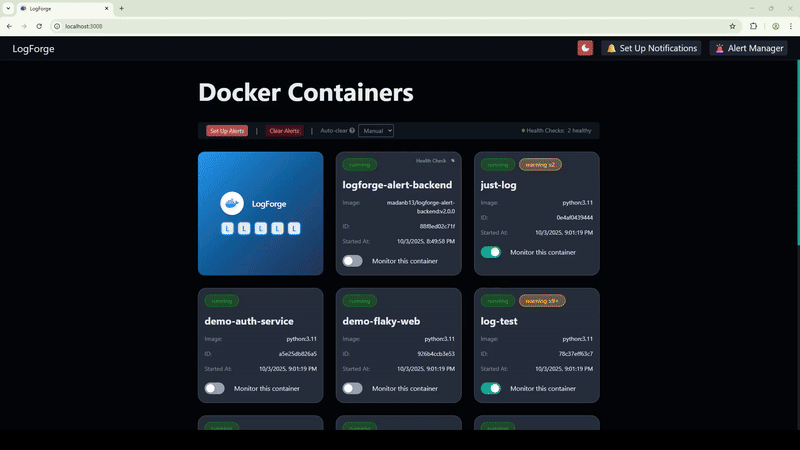Self-hosted service monitoring dashboard for Docker containers, with notifications.
Built for developers who want simple log visibility, service crash detection, and real-time alerts — without needing to stitch together multiple heavy tools.
Speed up dev cycles, fix faster. Ship faster.
Ditch the SSH+logs+grep cycle
git clone https://github.com/log-forge/logforge.git
cd logforge
docker compose up -d --buildThen open: http://localhost:3000
Default container names are logforge-frontend, logforge-backend and logforge-notifier. Default ports are 3000 (frontend), 8000 (backend) and 8083/8085 (notifier). If you want to change them, edit the .env file.
# Sets the name for the container that will run the backend service.
# This name is used to identify the container
BACKEND_SERVICE_CONTAINER_NAME="logforge-backend"
# Specifies the port number the backend application inside the container listens on for incoming connections.
BACKEND_SERVICE_PORT="8000"
# Defines the port number on your host machine (your computer) that will forward traffic to the BACKEND_SERVICE_PORT inside the container.
# In this case, accessing http://localhost:8000 on your machine will connect to port 8000 inside the backend container.
EXPOSED_BACKEND_PORT="8000"
# Sets the name for the container running the frontend service.
FRONTEND_SERVICE_CONTAINER_NAME="logforge-frontend"
# Specifies the port number that the frontend application (the web server) listens on inside its container.
FRONTEND_SERVICE_PORT="3000"
# Defines the port number on your host machine that maps to the FRONTEND_SERVICE_PORT inside the container.
# Accessing http://localhost:3000 on your machine will connect to port 3000 inside the frontend container.
EXPOSED_FRONTEND_PORT="3000"
# Sets the name for the container running the notifier service
NOTIFIER_SERVICE_CONTAINER="logforge-notifier"
# Specifies the port number the notficaiton service uses to send notfications
NOTIFIER_PLAIN_PORT="8083"
# Defines the port number the norfication service uses for the web UI
NOTIFIER_WEB_PORT="8085"
# Sets the name for rhe container running the auto-update service
AUTOUPDATE_SERVICE_NAME="logforge-autoupdate"
* Then go to the correct port you set in .env for the frontend
- Service auto-detection (Docker containers)
- Service status (Running, Crashed, Stopped)
- Log streaming and filtering
- Customizable alert keywords — monitor Internal Docker services
- Notification support for Email, Discord, Telegram, Slack and Gotify
- Interactive terminal access per container
- File system viewer to browse container files
- Easy Docker-based deployment
- Self-hosted, lightweight — built with dev environments in mind
LogForge was built for developers who need a simple, lightweight way to monitor services during development — without setting up huge production systems. See how we compare with other popular tools.
LogForge is optimized for developer environments:
🔹 Instantly see which services are running, crashed, or stopped
🔹 View and filter logs per service
🔹 Get alerts when internal services show errors or warnings based on keywords you set
🔹 Deploy everything in seconds with a single command
Built for dev environments, not production — fast, simple, and focused. No complex setup. No huge monitoring stacks.
Deploy in seconds with one simple command.
We got you — see Premium.
We welcome contributions that make LogForge better for fast-moving dev teams.
- Improving alerting logic or performance
- Enhancing container/service detection
- Adding support for non-Docker environments
- UI/UX polish
- Bug fixes, docs, or typo cleanups
We review all PRs quickly.
If it’s useful to you, it’s likely useful to others too!
🙋♀️ Have an idea or missing feature?
Open a GitHub issue and tell us what you’d love to see.
AGPLv3
See the LICENSE file for full details on usage and restrictions.
